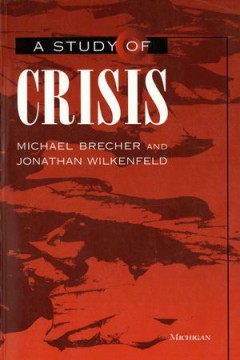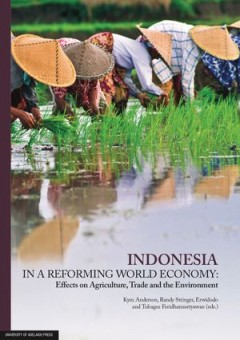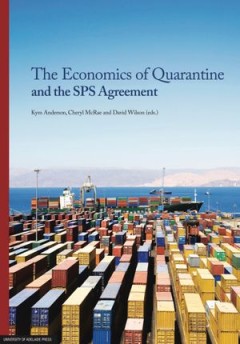Filter by

Contemporary Perspectives on Ageism
Older adults outnumbering children; Gerontology/geriatrics; Aging world population; The study of ageism; Ageism is the most prevalent form of discrimination
- Edition
- -
- ISBN/ISSN
- 9783319738192
- Collation
- -
- Series Title
- -
- Call Number
- 330 AYA c

Cohabitation and Marriage in The Americas: Geo-Historical Legacies and New Tr…
This open access book presents an innovative study of the rise of unmarried cohabitation in the Americas, from Canada to Argentina. Using an extensive sample of individual census data for nearly all countries on the continent, it offers a cross-national, comparative view of this recent demographic trend and its impact on the family. The book offers a tour of the historical legacies and regional…
- Edition
- -
- ISBN/ISSN
- 9783319314402
- Collation
- -
- Series Title
- -
- Call Number
- 301 COH c

A Study of Crisis
As the twentieth century draws to a close, it is time to look back on an epoch of widespread turmoil, including two world wars, the end of the colonial era in world history, and a large number of international crises and conflicts. This book is designed to shed light on the causes and consequences of military-security crises since the end of World War I, in every region, across diverse economic…
- Edition
- -
- ISBN/ISSN
- 9780472903122
- Collation
- -
- Series Title
- -
- Call Number
- 337 WIL s

The Japanese Automotive Industry: Model and Challenge for the Future?
As the University of Michigan Center for Japanese Studies reflected on the deteriorating position of the domestic auto industry in the fall of 1980, and the strong competitive threat being posed by the Japanese automakers, we were struck by the extraordinary low quality of the public discussion of these critical issues. The national importance of the issues seemed only matched by the superficia…
- Edition
- -
- ISBN/ISSN
- 9780472902033
- Collation
- -
- Series Title
- -
- Call Number
- 300 JAP j

Industry at the Crossroads
International communication as a field of inquiry is, in fact, not very “internationalized.” Rather, it has been taken as a conceptual extension or empirical application of U.S. communication, and much of the world outside the West has been socialized to adopt truncated versions of Pax Americana’s notion of international communication. At stake is the “subject position” of academic an…
- Edition
- -
- ISBN/ISSN
- 9780472902040
- Collation
- -
- Series Title
- -
- Call Number
- 330 IND i

Indonesia in a Reforming World Economy : Effects on Agriculture, Trade and th…
In the mid-1990s a joint research project was established between CASER (Bogor), CIES (Adelaide), CSIS ( Jakarta) and RSPAS (at ANU, Canberra) to examine interactions between agriculture, trade and the environment in Indonesia. Funded by the Australian Centre for International Agricultural Research (ACIAR Project No. 9449), the specific objective of the project was to assess the production, con…
- Edition
- -
- ISBN/ISSN
- 9780980623871
- Collation
- -
- Series Title
- -
- Call Number
- 650

Imperial Standard Imperial Oil, Exxon, and the Canadian Oil Industry from 1880
For over 130 years, Imperial Oil dominated Canada’s oil industry. From Petrolia to Turner Valley, Imperial was always nearby and ready to take charge. Their 1947 discovery of crude oil in Leduc, Alberta transformed the industry and the country. But from 1899 onwards, two-thirds of the company was owned by an American giant, making Imperial Oil one of the largest foreign-controlled multination…
- Edition
- -
- ISBN/ISSN
- 9781773850368
- Collation
- -
- Series Title
- -
- Call Number
- 650

The Economics of Quarantine and the SPS Agreement
his collection resulted from an international workshop funded and organised by Biosecurity Australia, the agency of government responsible for analysing Australia's quarantine import risks and for negotiating multilateral SPS rules and less restrictive access to overseas markets for Australian produce. The workshop, which was held at the Melbourne Business School on 24-25 October 2000, brought …
- Edition
- -
- ISBN/ISSN
- 9781922064325
- Collation
- -
- Series Title
- -
- Call Number
- 650

Global wine markets: 1860 to 2016 : A Statistical Compendium
Until recently, most grape-based wine was consumed close to where it was produced, and mostly that was in Europe. Now more than two-fifths of all wine consumed globally is produced in another country, including in the Southern Hemisphere, the USA and Asia. This latest edition of global wine statistics not only updates data to 2016 but also adds another century of data. The motivation to assembl…
- Edition
- -
- ISBN/ISSN
- 9781925261660
- Collation
- -
- Series Title
- -
- Call Number
- 650

Which Winegrape Varieties are Grown Where? A Global Empirical Picture
In an increasingly interconnected world wine market, evolving consumer demands, technologies, and climate have all contributed to large shifts in global patterns of production and consumption of wine. These shifting patterns of wine production and consumption have entailed changes in the vineyard in terms of total area planted, production practices, and the mix of grape varieties grown. In this…
- Edition
- -
- ISBN/ISSN
- 9781922064684
- Collation
- -
- Series Title
- -
- Call Number
- 650
 Computer Science, Information & General Works
Computer Science, Information & General Works  Philosophy & Psychology
Philosophy & Psychology  Religion
Religion  Social Sciences
Social Sciences  Language
Language  Pure Science
Pure Science  Applied Sciences
Applied Sciences  Art & Recreation
Art & Recreation  Literature
Literature  History & Geography
History & Geography